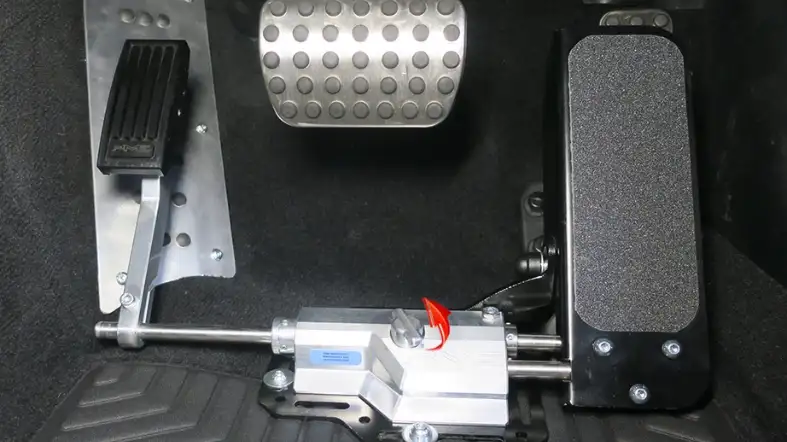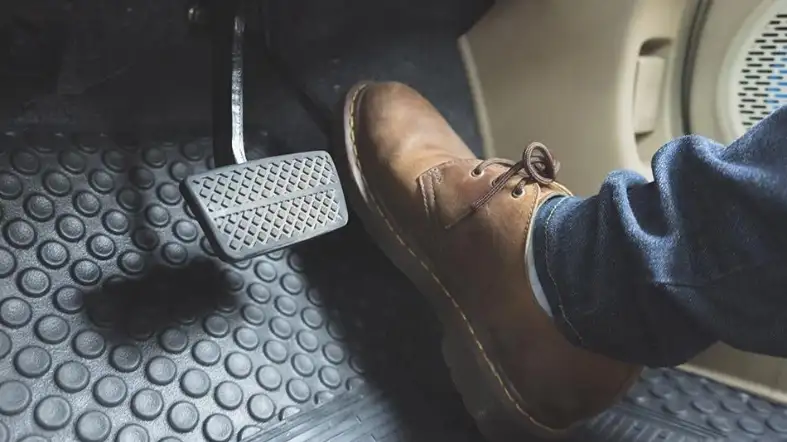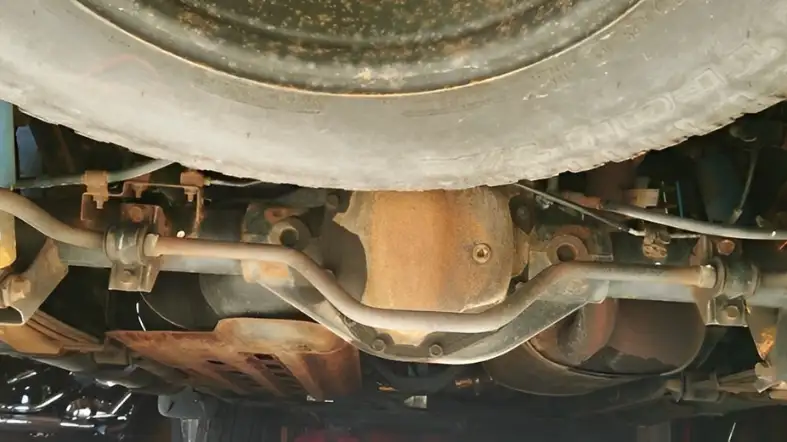Have you ever experienced a humming noise when you take your foot off the accelerator pedal? If yes, then you are not alone.
This issue is quite common among car owners, and several factors, including worn-out tires, damaged fuel pumps, or transmission overheating, can cause it.
However, the good news is that there are some simple troubleshooting steps you can take to identify and fix the problem.
In this article, we will discuss the possible causes of a humming noise when decelerating and share some tips on how to prevent and fix this issue.
Humming Noise When Taking Foot Off Accelerator
Humming noise when taking your foot off the accelerator could be caused by several factors related to the vehicle’s drivetrain or wheels. Here are some possibilities:

Wheel bearings:
Wheel bearings play a crucial role in the smooth rotation of your vehicle’s wheels.
When they wear out or become damaged, they can produce a distinct humming noise that usually increases with speed.
The noise may be noticeable not only when you’re accelerating but also when you’re decelerating.
To check for faulty wheel bearings, you can perform a simple test. Find an empty and safe area to drive your car, then gradually increase your speed.
Pay close attention to any humming or rumbling sounds. If you suspect a problem with the wheel bearings, it’s essential to have them inspected and replaced by a professional mechanic.
Transmission problems:
The transmission is responsible for transferring power from the engine to the wheels, allowing your vehicle to change gears and control speed.
If there’s an issue with the transmission, such as worn-out gears or low fluid levels, it can lead to a humming noise when you release the accelerator.
To diagnose potential transmission problems, you should check the transmission fluid level and condition regularly.
If the fluid is low or looks dark and burnt, it’s a sign that your transmission may need attention.
In such cases, it’s best to take your vehicle to a certified mechanic who specializes in transmissions to properly diagnose and fix any issues.
Differential problems:
The differential is another crucial component of the drivetrain responsible for distributing power from the engine to the wheels.
It allows the wheels to rotate at different speeds while turning. If there’s a problem with the differential, such as worn-out gears or lack of proper lubrication, it can result in a humming noise when you decelerate.
You might also notice additional symptoms, such as a whining noise during turns.
If you suspect issues with your vehicle’s differential, it’s essential to have it inspected and repaired by a qualified mechanic to avoid further damage to your drivetrain.
Tires:
Unevenly worn or damaged tires can also be a source of the humming noise you’re experiencing.
Tires that have worn unevenly may produce a humming sound when you accelerate or decelerate.
To check for tire issues, examine the tread wear pattern on all four tires. If you notice significant differences in wear, it’s a sign that your tires may need to be rotated, balanced, or replaced.
Regularly inspecting and maintaining your tires will not only help reduce noise but also improve overall safety and fuel efficiency.
Exhaust system:
A damaged or clogged exhaust system can also contribute to a humming noise in your vehicle.
The exhaust system plays a critical role in directing harmful gases away from the engine and reducing noise.
If there’s damage or a blockage in the exhaust system, it can cause abnormal sounds, including humming or rumbling.
Inspect your exhaust system for any visible signs of damage, such as rust, holes, or loose components.
If you detect any issues, have a professional mechanic examine and repair the exhaust system to ensure it functions correctly and keeps emissions at a safe level.
Expert Tips for Diagnosing and Fixing a Humming Noise When You Take Your Foot Off the Gas

Here are some expert tips for diagnosing and fixing this issue.
Check for Grounding Issues
One potential cause of the humming noise in your car could be grounding issues.
If there is no path to the ground or multiple paths to different grounds, it can cause a ground loop and lead to unwanted noise in your speakers or recordings.
To resolve this issue, check your car’s grounding system and ensure common ground.
Inspect Transmission Components
If the humming noise increases in intensity as the engine rpm rises, it could point to a malfunctioning transmission pump or pump shaft.
You may also want to inspect the transmission fluid level and check for any signs of wear or damage to the transmission bearings, shafts, or gears.
Check for Exhaust Leaks
Exhaust leaks can also cause humming or hissing noises when you take your foot off the gas pedal.
Inspect the exhaust system for any leaks or holes, and consider replacing any damaged components.
Check the Throttle Body
Another potential cause of humming noise in your car could be a faulty throttle body.
Make sure that the fuel mixture is correct and that there is no obstruction in the fuel line.
Inspect the engine for signs of overheating, carbon buildup, or other performance issues.
Clean the Microwave
If you are experiencing humming noise from your microwave, sometimes simply cleaning the cooling fan can solve the problem if the noise is due to dirt or clogs obstructing the fan
Other Causes
Other potential causes of humming noise when taking your foot off the gas pedal could include engine misfire, transmission issues, or water pump problems.
Troubleshooting a Humming Noise When Decelerating.

Here are some common causes and troubleshooting steps to help you identify and fix the problem.
Worn Out Tires
One of the most common causes of a humming noise when decelerating is worn-out tires ].
As your tires wear down, the treads become less effective at gripping the road, causing increased road noise.
If you suspect, your tires may be the culprit, inspect them for signs of wear and replace them if necessary.
Subwoofer Interference
If you have a subwoofer installed in your vehicle, it’s possible that it could be causing interference and producing a humming noise when decelerating.
To fix this issue, try changing the polarity of the subwoofer’s connection by reversing the power plug’s orientation.
Engine or Transmission Issues
Humming noises when decelerating can also be caused by issues with the engine or transmission.
Low fluid levels, worn bearings, or other internal damage could be the culprit.
If you suspect this may be the cause, it’s best to take your vehicle to a mechanic for a proper diagnosis and repair.
Fuel Pump Problems
Another possible cause of a humming noise when decelerating is a damaged fuel pump ].
A bad or faulty fuel pump can cause low fuel pressure, resulting in loud humming sounds in the gas tank.
If this is the issue, you’ll need to have the fuel pump replaced.
Differential Drive Issues
If you’re experiencing a humming noise when decelerating in a vehicle with a differential drive, such as a robotics project, it’s possible that one of the motors is not functioning properly.
In some cases, the motor may hum or fail to run when connected through a driver but works fine when directly connected to a battery.
Other Possible Causes
There are several other possible causes of a humming noise when decelerating, including damaged wheel bearings, worn-out brake pads, and problems with the power steering system.
If you’re unsure of the cause, it’s best to take your vehicle to a mechanic for a proper diagnosis.
The Different Types of Humming Noises You Might Hear When You Stop Accelerating

Here are some of the different types of humming noises you:
Tire noise:
If you hear a humming noise that sounds like it’s coming from the tires, it could be caused by uneven tire wear or a damaged tire.
This can cause the tires to produce a humming noise that increases in volume as you drive faster decreasing when you slow down.
Wheel bearing noise:
If the humming noise is coming from one of the wheels, it could be caused by a worn or damaged wheel bearing.
A damaged wheel bearing can produce a humming noise that changes in pitch as you drive and may also cause vibrations in the steering wheel.
Brake noise:
If the humming noise is coming from the brakes, it could be caused by worn brake pads or rotors.
This can cause a humming noise that increases in volume as you apply the brakes and then decreases as you come to a stop.
Transmission noise:
If the humming noise is coming from the transmission, it could be caused by worn gears or bearings.
This can cause a humming noise that changes in pitch as you accelerate or decelerate and may also be accompanied by vibrations in the vehicle.
It’s important to get any unusual noises checked out by a mechanic, as they can be a sign of a serious problem that could affect your vehicle’s performance and safety.
Regular Maintenance to Prevent a Humming Noise When You Let Off the Gas Pedal
Change Worn Tires
Worn-out tires are a common cause of humming noise when decelerating. Regularly inspect your tires and replace them when they are worn out.
Also, make sure your tires are balanced and properly inflated, as unbalanced tires can cause humming noise while driving.
Check Brake Pads
Worn brake pads can cause a humming noise when you let off the gas pedal. It’s crucial to inspect your brake pads regularly and replace them if they are worn out.
Also, ensure that your brake rotors are not warped or damaged, as this can cause humming noise when you brake or decelerate.
Inspect Wheel Bearings
Faulty wheel bearings can cause a humming noise when you decelerate. Regular inspection of your wheel bearings can help prevent this issue.
If you notice any sign of wear or damage, replace them immediately.
Change the Transmission Fluid
A lack of lubrication caused by low transmission fluid levels can cause humming noise while decelerating.
Regularly check and change your transmission fluid according to your manufacturer’s recommendation.
Keep the Fuel Pump in Good Condition
A damaged fuel pump can cause a humming noise while decelerating. Regularly inspect your fuel pump and replace it if it’s faulty
Frequently Asked Question
Q. Is It Safe To Drive A Car That Makes A Humming Noise When You Take Your Foot Off The Accelerator?
A: It depends on the cause of the humming noise. If it’s due to worn-out wheel bearings, for example, driving your car with this issue could cause the wheels to seize up, leading to a serious accident.
It’s always best to have your car inspected by a professional mechanic as soon as possible.
Q. How Much Does It Cost To Fix A Humming Noise When You Take Your Foot Off The Accelerator?
A: The cost of fixing a humming noise when you take your foot off the accelerator varies depending on the cause of the issue.
For example, replacing worn-out wheel bearings can cost several hundred dollars, while fixing uneven tire wear may only require a tire rotation and balance, which can cost around $50-$100.
Q. Can I Fix A Humming Noise When Taking My Foot Off The Accelerator Myself?
A: If you have experience working on cars and the necessary tools, you can fix some issues that cause a humming noise when taking your foot off the accelerator, such as uneven tire wear or damaged brake components.
However, more complex issues like worn-out wheel bearings or damaged suspension components should be fixed by a professional mechanic.
Conclusion:
Several factors, including worn-out tires, a damaged fuel pump, or transmission overheating can cause humming noise when you take your foot off the accelerator pedal.
Regular maintenance, such as tire rotation and fluid checks, can prevent some of these issues from occurring.
However, suppose you are already experiencing a humming noise when decelerating.
In that case, it is essential to identify the root cause of the problem and fix it as soon as possible to avoid further damage to your vehicle.
Hopefully, the tips we shared in this article will help you troubleshoot and fix this issue quickly and efficiently.
